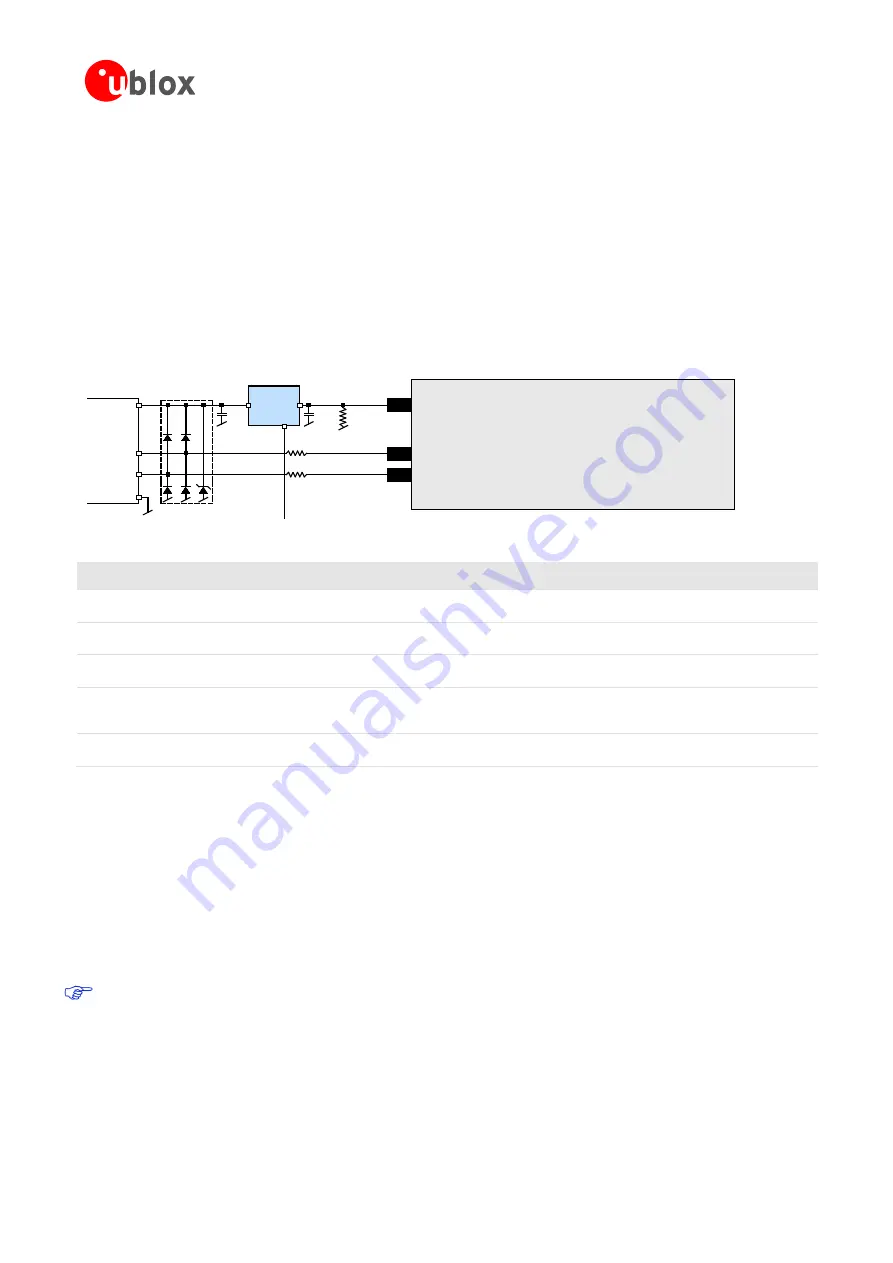
LEA-M8F - Hardware Integration Manual
UBX-14000034 - R03
Early Production
Information
Hardware
description
Page 9 of 30
1.5.2.1
USB external components
The USB interface requires some external components to comply with the USB 2.0 specification. These are
shown below in Figure 2 and listed in Table 2. To comply with USB specifications, VBUS must be connected
through an LDO (U1) to pin 24 (
VDD_USB)
to regulate the 5 V VBUS down to a nominal 3.3 V for the module.
The LEA-M8F module USB interface is intended to be used as a USB
self-powered
device deriving its power
supply from
VCC.
However, the module power supply (
VCC
) can be turned off independently of the host VBUS
supplying VDD_USB. With VDD_USB active, the USB host would receive a signal indicating that the device is
present and ready to communicate. This should be avoided by disabling the LDO (U1) using the enable signal
(EN) of the VCC-LDO enabled by e.g.
VCC
. Depending on the characteristics of the LDO (U1) it is recommended
to add a pull-down resistor (R11) at its output to ensure
VDD_USB
is not floating if the LDO (U1) is disabled or
the USB cable is disconnected i.e. VBUS is not supplied.
Module
VDD_USB
LDO
VDD_USB
R4
USB_DP
USB_DM
R5
C24
C23
D2
VBUS
DP
DM
GND
US
B D
evi
ce Co
nn
ec
to
r
U1
EN
R11
EN
Figure 2: USB Interface
Name Component Function
Comments
U1
LDO
Regulates VBUS (4.4 …5.25 V)
down to a voltage of 3.3 V.
Almost no current requirement (~1 mA) if the GNSS receiver is operated as a
USB self-powered device.
C23,
C24
Capacitors
Required according to the specification of LDO U1
D2
Protection
diodes
Protect circuit from overvoltage
/ ESD when connecting.
Use low capacitance ESD protection such as ST Microelectronics USBLC6-2.
R4, R5
Serial
termination
resistors
Establish a full-speed driver
impedance of 28…44
Ω
A value of 27
Ω
is recommended.
R11
Resistor
100 k
Ω
is recommended for USB self-powered setup. For bus-powered setup,
R11 can be ignored.
Table 2: Summary of USB external components
1.5.3
Display Data Channel (DDC)
An I
2
C compatible Display Data Channel (DDC) interface is available for serial communication with an external
host CPU. The interface only supports slave mode operation (master mode is not supported). The DDC protocol
and electrical interface are fully compatible with the Fast-Mode of the I
2
C industry standard. The DDC pins
SDA
and
SCL
have internal 10 k
Ω
pull-up resistors.
For more information about the DDC implementation, see the
u-blox M8 Receiver Description Including Protocol
[2]. For bandwidth information, see the
LEA-M8F Data Sheet
[1]. For timing, parameters consult the
I
2
C-bus specification
The u-blox M8 DDC interface supports serial communication with u-blox cellular modules. See the
specification of the applicable cellular module to confirm compatibility.
1.5.4
SPI
An SPI interface is available for communication to a host CPU, however its interface connections are shared with
the UART and DDC interface pins. The SPI interface is not available in the default configuration but can be










































